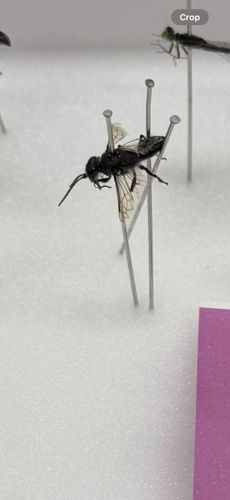Scoliid Wasp
Scientific Name: Scolia dubia (or similar species within Scoliidae)
Order & Family: Hymenoptera, Scoliidae
Size: Typically 1.5 to 2.5 cm (0.6 to 1 inch) in length.

Natural Habitat
Found in various habitats, often in gardens, fields, and woodlands where their hosts (scarab beetle larvae) are present, especially in areas with sandy or loose soil.
Diet & Feeding
Adult Scoliid wasps feed on nectar and pollen from flowers. The larvae are parasitic and feed on the grubs of scarab beetles (e.g., green June beetles, Japanese beetles).
Behavior Patterns
Adult wasps are often seen flying low over lawns and sandy areas in search of host beetle larvae. Females dig into the soil to find a grub, sting and paralyze it, and then lay an egg on it. The wasp larva then consumes the beetle grub. They are solitary wasps and do not form colonies.
Risks & Benefits
Generally considered beneficial insects as their larvae parasitize and control populations of destructive lawn pests (scarab beetle grubs). They are not aggressive towards humans and typically only sting if handled or severely provoked. Their sting is usually mild and comparable to a bee sting.
Identified on: 9/19/2025